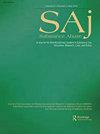Cannabis and Cocaine Use, Drinking Outcomes, and Quality of Life in General Hospital Inpatients with Alcohol Use Disorder
IF 2.4
3区 医学
Q2 SUBSTANCE ABUSE
引用次数: 0
Abstract
Background: While associations between cannabis and cocaine use, and heavy drinking and quality of life (QOL), are well-established in the general population, it is unclear whether they are present in hospital inpatients with alcohol use disorder (AUD). The aim of the study was to assess associations between cannabis and cocaine use and two outcomes [heavy drinking days (HDDs) and QOL] among hospital inpatients with AUD. Methods: Hospitalized patients with AUD and at least one past-month HDD participated in this cross-sectional study. Cannabis and cocaine use were assessed using the Alcohol, Smoking, and Substance Involvement Screening Test. HDDs were assessed using the Timeline Followback. QOL was assessed by the WHOQOL–BREF instrument. Multivariable regression models assessed associations. Results: Of 248 participants, 225 (91%) had severe AUD. There were no statistically significant associations between: recent cannabis use and HDDs [Incidence Rate Ratio (IRR) = 0.95; 95% Confidence Interval (95% CI): 0.80, 1.14], cocaine use and HDDs [IRR = 0.88; 95% CI: 0.66, 1.18], or both cannabis and cocaine use and HDDs [IRR = 0.87; 95%CI: 0.70, 1.09], as compared to use of neither cannabis nor cocaine. Use of cannabis, cocaine, and both, were not associated with QOL [(odds ratio (OR) = 0.98; 95% CI:0.55, 1.74), (OR = 0.76; 95% CI:0.30, 1.93), (OR = 1.00; 95%CI: 0.49, 2.03), respectively]. Conclusions: Among hospital inpatients with AUD, there were no significant associations between cannabis and cocaine use, heavy drinking, or QOL. Our findings raise questions regarding how drug use affects AUD and whether similar results would be found among those with milder AUD and in prospective studies.综合医院酒精使用障碍住院患者的大麻和可卡因使用、饮酒结果和生活质量
背景:虽然大麻和可卡因的使用以及酗酒和生活质量之间的联系在普通人群中得到了证实,但尚不清楚是否存在于患有酒精使用障碍(AUD)的住院患者中。该研究的目的是评估AUD住院患者中大麻和可卡因的使用与两种结果[重度饮酒天数(HDD)和生活质量]之间的关系。方法:AUD和至少一个月的HDD住院患者参与了这项横断面研究。使用酒精、吸烟和物质参与筛查测试评估大麻和可卡因的使用情况。采用时间线追踪法对HDD进行评估。通过WHOQOL–BREF工具评估生活质量。多变量回归模型评估了相关性。结果:在248名参与者中,225人(91%)患有严重的AUD。近期大麻使用与HDDs之间没有统计学上的显著关联[发病率比率(IRR)=0.95;95%置信区间(95%CI)=0.80,1.14],可卡因使用与HDD[IRR=0.88;95%CI:0.66,1.18],或大麻和可卡因使用与HDD之间都没有统计学上显著关联[IRR=0.87;95%CI:0.70,1.09],与既不使用大麻也不使用可卡因相比。大麻、可卡因和两者的使用与生活质量无关[(比值比(OR)=0.98;95%CI:0.55,1.74),(OR=0.76;95%CI:0.30,1.93),(OR分别为1.00;95%CI:0.49,2.03)]。结论:在住院AUD患者中,大麻与可卡因使用、酗酒或生活质量之间没有显著关联。我们的研究结果提出了药物使用如何影响AUD的问题,以及在AUD较轻的患者和前瞻性研究中是否会发现类似的结果。
本文章由计算机程序翻译,如有差异,请以英文原文为准。
求助全文
约1分钟内获得全文
求助全文
来源期刊

Substance abuse
SUBSTANCE ABUSE-
CiteScore
5.90
自引率
2.90%
发文量
88
审稿时长
>12 weeks
期刊介绍:
Now in its 4th decade of publication, Substance Abuse journal is a peer-reviewed journal that serves as the official publication of Association for Medical Education and Research in Substance Abuse (AMERSA) in association with The International Society of Addiction Medicine (ISAM) and the International Coalition for Addiction Studies in Education (INCASE). Substance Abuse journal offers wide-ranging coverage for healthcare professionals, addiction specialists and others engaged in research, education, clinical care, and service delivery and evaluation. It features articles on a variety of topics, including:
Interdisciplinary addiction research, education, and treatment
Clinical trial, epidemiology, health services, and translation addiction research
Implementation science related to addiction
Innovations and subsequent outcomes in addiction education
Addiction policy and opinion
International addiction topics
Clinical care regarding addictions.
 求助内容:
求助内容: 应助结果提醒方式:
应助结果提醒方式:


